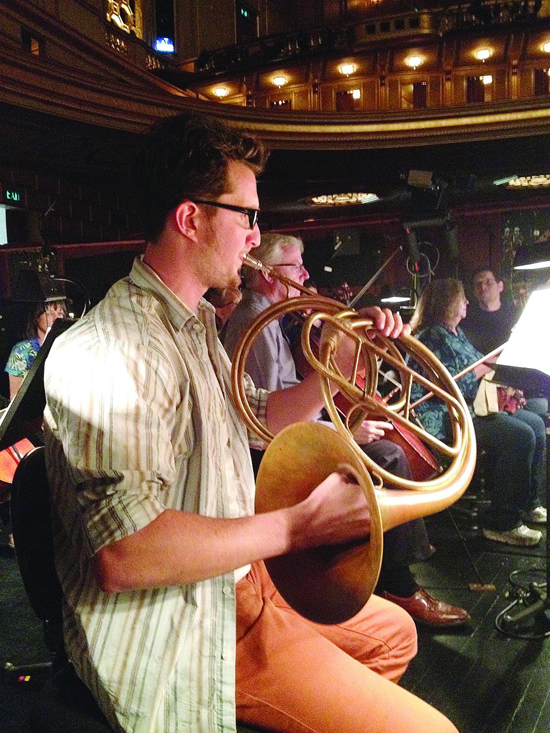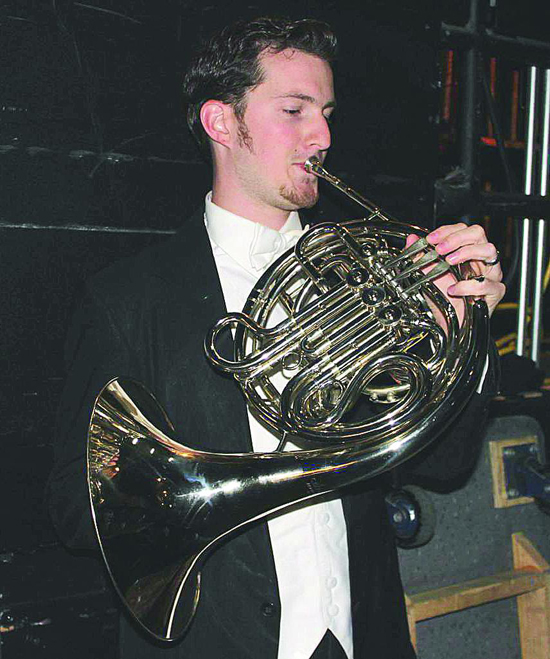 | | | Kevin Rivard playing the natural horn (not his normal instrument).
Photo Keith Green
| | | | | | When he was in the fourth grade at Northside Christian School in St. Petersberg, Fla., local resident Kevin Rivard really wanted to play the trumpet. But at his parents' insistence, he learned the clarinet, with the promise that if he was still interested in two years, he could take up the brass instrument.
 Two years later, the trumpet still called to Rivard, but with the encouragement of his music teacher, Carolyn Wahl, he took the French horn home to give it a try.
Two years later, the trumpet still called to Rivard, but with the encouragement of his music teacher, Carolyn Wahl, he took the French horn home to give it a try.
 He obviously liked it because today, some 20 years later, Rivard is co-principal horn of the San Francisco Opera Orchestra and principal horn of the San Francisco Ballet Orchestra.
He obviously liked it because today, some 20 years later, Rivard is co-principal horn of the San Francisco Opera Orchestra and principal horn of the San Francisco Ballet Orchestra.
 And the trumpet? He's never played it! But he does credit Wahl for being his mentor and says it was "her tutelage that gave me a chance at this career."
And the trumpet? He's never played it! But he does credit Wahl for being his mentor and says it was "her tutelage that gave me a chance at this career."
 From the very beginning, Rivard loved the horn - he loved playing it, he loved practicing it, he loved the music, the sound and the challenge. The French horn is a brass instrument made of more than 20 feet of tubing wrapped into a coil with a flared bell and a funnel-shaped mouthpiece.
From the very beginning, Rivard loved the horn - he loved playing it, he loved practicing it, he loved the music, the sound and the challenge. The French horn is a brass instrument made of more than 20 feet of tubing wrapped into a coil with a flared bell and a funnel-shaped mouthpiece.
 "It's known for being a very difficult instrument," said Rivard, who lives in Saranap, just outside of Lafayette. "With most instruments, you put down the right finger and the right note comes out. The horn has a very large range with over four octaves and it works with a series of overtones, or a harmonic series. Each fingering produces a series of notes so that there are over 12 possible notes per fingering. Consequently, the accuracy of each note is determined by your lips," he explained. "If you're off by just a fraction, the most glorious, beautiful sound can suddenly sound like a dying goat ."
"It's known for being a very difficult instrument," said Rivard, who lives in Saranap, just outside of Lafayette. "With most instruments, you put down the right finger and the right note comes out. The horn has a very large range with over four octaves and it works with a series of overtones, or a harmonic series. Each fingering produces a series of notes so that there are over 12 possible notes per fingering. Consequently, the accuracy of each note is determined by your lips," he explained. "If you're off by just a fraction, the most glorious, beautiful sound can suddenly sound like a dying goat ."
 According to Rivard, the sound has a huge range of expression. In movies, the horn has the voice of our favorite hero. "It's also the voice of love in many romantic scenes. It has the sweet, soulful sound that grabs at the heartstrings," he stated, adding, that it is also often a blending instrument, "helping the brass and woodwinds, or woodwinds and strings."
According to Rivard, the sound has a huge range of expression. In movies, the horn has the voice of our favorite hero. "It's also the voice of love in many romantic scenes. It has the sweet, soulful sound that grabs at the heartstrings," he stated, adding, that it is also often a blending instrument, "helping the brass and woodwinds, or woodwinds and strings."
 "The warmth and depth of the horn's sound give it the ability to meld together all voices in the orchestra," he said.
"The warmth and depth of the horn's sound give it the ability to meld together all voices in the orchestra," he said.
 A Juilliard graduate, Rivard is in his sixth season with both the Opera and Ballet orchestras. He's won numerous solo competitions, including the 2007 International Horn Competition of America. He came to the Bay Area following stints as assistant principal horn with both the Florida Orchestra and Colorado Symphony Orchestra and has performed with many others, including The Metropolitan Opera Orchestra, Houston Symphony and Los Angeles Philharmonic.
A Juilliard graduate, Rivard is in his sixth season with both the Opera and Ballet orchestras. He's won numerous solo competitions, including the 2007 International Horn Competition of America. He came to the Bay Area following stints as assistant principal horn with both the Florida Orchestra and Colorado Symphony Orchestra and has performed with many others, including The Metropolitan Opera Orchestra, Houston Symphony and Los Angeles Philharmonic.
 Even with years of experience, Rivard practices just about every day. "I do a lot of drills, exercises, stuff that's not actual music. I want to be technically able to play anything."
Even with years of experience, Rivard practices just about every day. "I do a lot of drills, exercises, stuff that's not actual music. I want to be technically able to play anything."
 In addition to his San Francisco jobs, Rivard teaches at San Jose State University and performs in solos and recitals throughout the area. He also teaches private horn lessons. He'll be playing with the Gold Coast Chamber Players in a "Horn and Plenty" concert at the Lafayette Library on Jan. 18 and will be a featured speaker during their pre-concert talk, beginning at 7 p.m.
In addition to his San Francisco jobs, Rivard teaches at San Jose State University and performs in solos and recitals throughout the area. He also teaches private horn lessons. He'll be playing with the Gold Coast Chamber Players in a "Horn and Plenty" concert at the Lafayette Library on Jan. 18 and will be a featured speaker during their pre-concert talk, beginning at 7 p.m.
 Rivard is as passionate about arts education as he is about his music. He volunteers at both Stanley Middle School and Acalanes High School, as well as at other area schools. It's a personal thing, he said. "Kids in this area - which is so rich with cultural opportunities - should experience live, professional music. My goal is to let them experience it up close, let them hear and feel the sound," he stated. He typically performs a few pieces and then has an open forum. "I think great, high-end classical music has a connection to every person's life.
Rivard is as passionate about arts education as he is about his music. He volunteers at both Stanley Middle School and Acalanes High School, as well as at other area schools. It's a personal thing, he said. "Kids in this area - which is so rich with cultural opportunities - should experience live, professional music. My goal is to let them experience it up close, let them hear and feel the sound," he stated. He typically performs a few pieces and then has an open forum. "I think great, high-end classical music has a connection to every person's life.
 "What's so good about having a strong foundation in the arts is that you have this great work ethic, great discipline, great creativity," he continued. Without learning the arts, Rivard said, an entire portion of the brain goes unused. "With music, you learn how to get the two sides of your brain working together."
"What's so good about having a strong foundation in the arts is that you have this great work ethic, great discipline, great creativity," he continued. Without learning the arts, Rivard said, an entire portion of the brain goes unused. "With music, you learn how to get the two sides of your brain working together."
 Rivard is part of a musical family: his wife, Liz, is a violinist, who freelances with local symphonies and chamber groups; his 4-year-old daughter is taking violin lessons and his 6-year-old son, who is much more interested in soccer, plays the piano.
Rivard is part of a musical family: his wife, Liz, is a violinist, who freelances with local symphonies and chamber groups; his 4-year-old daughter is taking violin lessons and his 6-year-old son, who is much more interested in soccer, plays the piano.
 The late Anton Horner, who was principal horn of the Philadelphia Orchestra, once said, "God made some people horn players. Others were not so fortunate." Rivard agrees with that. He expressed his happiness by noting that "when you have a job with great orchestras in a great area, it's the pinnacle of your career."
The late Anton Horner, who was principal horn of the Philadelphia Orchestra, once said, "God made some people horn players. Others were not so fortunate." Rivard agrees with that. He expressed his happiness by noting that "when you have a job with great orchestras in a great area, it's the pinnacle of your career."


|

